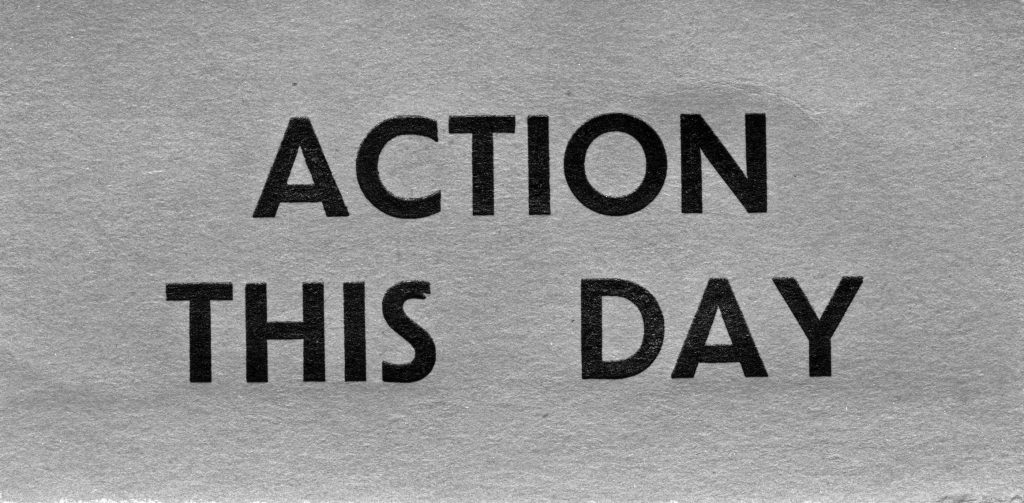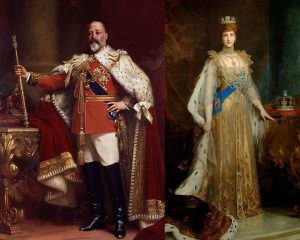Finest Hour 184
Action This Day – Spring 1894, 1919, 1944

4.1.2
May 19, 2019
Finest Hour 184, Second Quarter 2019
Page 40
By Michael McMenamin
125 Years Ago
Spring 1894 • Age 19
“I Would Not Believe You Could Be Such a Young Stupid”
Despite now being a Gentleman Cadet at Sandhurst, Churchill received a number of critical letters from his parents reminiscent of those he received at a much earlier age. On 10 April he wrote his mother Lady Randolph: “I want to come up on Saturday. I can’t endure two Sundays running at this place. All my friends are going away and one cannot work the whole time. I beg you to try and explain things to Papa should he disapprove.”
Papa, Lord Randolph, very much disapproved and wrote to his son on 13 April, “[As for] announcing your intention of coming up to town on Saturday…to this I particularly object. You have been just one day over a week at Sandhurst & you get restless & want to get away….Now it is no use telling me there is nothing to do on Sunday, because you can do work on Sunday instead of loitering about as I expect you do.… You need not answer this letter. I only want you to think over it and agree with it.” Ever eager to please his father, Churchill wrote back on 20 April: “I did not answer your letter of last Saturday—because you told me in it not to do so. Of course I willingly do what you think best in the matter of leave.”Unfortunately for Winston, 20 April was the date on which his father learned that he had twice damaged the expensive watch his father had given him, the second time when it fell into water. The next day, Lord Randolph wrote to him: “I would not believe you could be such a young stupid. It is clear you are not to be trusted with such a valuable watch & when I get it from Mr. Dent, I shall not give it [to] you back…Jack has had the watch I gave him longer than you have had yours…in all qualities of steadiness taking care of things & never doing stupid things Jack is vastly your superior.” Lord Randolph was apparently quite proud of his letter because he wrote to his wife the same day: “I have written a letter to Winston he won’t forget…You see I was really very angry for I cannot understand anybody not taking the greatest care of a good watch…it will be a long time before I give him anything worth having.”
While more sensitive and caring, his mother’s 22 April letter was almost as critical as his father’s: “I am so sorry you have got into trouble over your watch…I must own you are awfully careless….Oh! Winny what a harum scarum fellow you are! You really must give up being so childish.” Churchill defended himself in several letters, as he did not think he was to blame. Still, in his 22 April reply to his father, he concluded: “Please don’t judge me entirely on the strength of the watch. I am very very sorry about it. I am sorry to have written such a long and stupid letter, but I do hope you will take it in some measure as an explanation.” When Lord Randolph did not reply to his apology, Churchill tried again on 24 April “I know I have been very foolish and clumsy with the watch and fully deserve to have it taken away. I am very sorry to have been so stupid and careless—but I hope that you will not be cross with me any more about it—and that you will accept what I say as to [it] being an isolated case of not taking care of things.” Finally, on 1 May, Lord Randolph accepted his son’s apology “You need not trouble any more about the watch. It is quite clear that the rough work of Sandhurst is not suitable for a watch made by Dent.”
Churchill’s mismanagement of money remained—and would remain for the next six years—a matter of contention between mother and son. On 17 May she sent him a check for two pounds and wrote “I really think that Papa gives you a very fair allowance & you ought to make it do. He wld by very X if he knew I gave you money. It is yr own fault if you spend all yr money on food & then have nothing for other wants. I give you warning I shall not give you any more.”
Meanwhile, Lady Randolph could refer to her husband as Winston’s “Papa” in her letters, but Churchill had been forbidden by his father to do the same since he now preferred “Father.” Lord Randolph made this painfully clear when he wrote to his son on 19 June: “How stupid are you to not stick to ‘my dear father’ & relapse into ‘my dear Papa’. This is idiotic.”
100 Years Ago
Spring 1919 • Age 44
“Kill the Bolshie; Kiss the Hun”
In a letter to Prime Minister Lloyd George in February that was never sent, Churchill asserted that he “had no Russia Policy” and further claimed “So far, I am not responsible for sending a single man to Russia.”
This was not exactly accurate. Churchill did have a Russia policy, which he expressed to Violet Asquith as “Kill the Bolshie; kiss the Hun.” He was soon thereafter to send 8,000 men to Russia. In a 9 April letter to Lloyd George, he advocated ending the Allied blockade of food to Germany: “Feed Germany; fight Bolshevism; make Germany fight Bolshevism.” Churchill, therefore, was appalled when the Government sent 500,000 German prisoners back to Russia in April. These solders, he argued, could have been an army to aid the White Russians in North Russia. Instead, they were “simply sending a reinforcement of 500,000 trained men to join the armies of Lenin and Trotsky. This appears to be one of the capital blunders in the history of the world.”
On 4 March, the War Cabinet decided that all Allied troops were to be evacuated from North Russia at an early date. These troops were in bad shape and Churchill was authorized to send fresh troops, 8,000 volunteers from demobilized units, to ensure the safety of what he described in The World Crisis as “the worn-out garrison.” What Churchill did not address in his war memoirs is that, later in April, he proposed that the remaining British troops in North Russia, including the new volunteers, be permitted to move towards and attempt to link up with General Kolchak’s White Army forces in Siberia, inasmuch as the evacuation of the British troops through the frozen Arctic would not be possible for another two months. The local British commanders in Russia—Knox in Siberia, Maynard at Murmansk, and Ironside at Archangel—supported the idea, and Churchill’s War Office worked out plans that Lloyd George and the War Cabinet approved. As Churchill noted, “After conquering all the Huns—tigers of the world—I will not submit to be beaten by the baboons!” When the Russian soldiers in Archangel who were to have accompanied British forces mutinied in mid-May, Ironside had fifteen of them shot. By 29 May, British warships were moving south on the River Dvina to support Ironside’s advance along the river, and left-wing newspapers were calling Churchill the “gambler of Gallipoli” for starting a “new war in Russia.” Later in June, Kolchak’s Siberian army suffered a series of defeats. The Bolsheviks were starting to win.
75 Y ears Ago
Spring 1944 • Age 69
“He Is Not the Man He Was Twelve Months Ago”
The punishing pace of Churchill’s globe-trotting travels in 1943 and the illnesses that resulted from it were taking their toll. On the fourth anniversary of his becoming Prime Minister and with D-Day approaching, those around Churchill began to notice his growing fatigue. Sir Alexander Cadogan’s observation is typical: “He is not the man he was twelve months ago, and I really don’t know if he can carry on.”
Part of the explanation for this is physical. Churchill had suffered two mild heart attacks in December 1943. Clementine explained to their daughter Mary on 18 December, “Papa is very upset as he is beginning to see that he cannot get well in a few days and that he will have to lead what for him is a dreary monotonous life with no emotions or excitement.” Clementine’s explanation offers a mental aspect as well. She understood her husband’s nature. In the midst of war, Churchill did not have other activities to keep him preoccupied such as painting and writing during the run up to D-Day. And while he spent time inspecting the invasion troops with Eisenhower, his official duties were not that onerous or time-consuming.
By this time, D-Day was in the hands of the military, and Churchill no longer had much to do with the preparations. He conceived a mad plan to go along with British forces on D-Day. Alarmed, the King worked hard to frustrate his Prime Minister’s ambition. Frustrated, Churchill said to General Sir Alan Brooke that he no longer jumped out of bed the way he used to and felt as if he would be quite content to spend the whole day in bed. This was not, however—as Brooke supposed, an admission from the Prime Minister that he was beginning to fail. Rather, it was more a statement that he was bored with nothing to do. A man “beginning to fail” would not, in the ensuing decade, have been able to write multi-volume histories of the Second World War and the English-Speaking Peoples, create his own racing stables, and serve a second time as Prime Minister. In the three months before D-Day, no one knew how it would turn out. Once it succeeded, Churchill returned to form. He was no longer bored. There now was much to do.
Subscribe
WANT MORE?
Get the Churchill Bulletin delivered to your inbox once a month.





